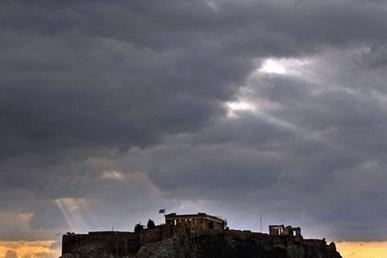
As Europe grapples with its financial crisis, ambivalence is growing among many Europeans about the region's common currency.
After choosing a common anthem - Beethoven's "Ode to Joy" - the European Union introduced another symbol to draw its members closer - a common currency. Launched a decade ago, the euro is now used by 17 European nations, making banking and travel easier for many of their citizens.
But today the euro is a symbol of division. Sovereign debt and banking problems that began in Greece have spread to other eurozone countries, sparking protests and bringing down several governments - most recently Italy's.
Even in Brussels, the administrative heart of the European Union, citizens like George Missikos are thinking twice about the European currency.
Missikos believes life was cheaper before the euro. With the old Belgian franc, Belgians could spend and still have money in their pockets. Today, he said, they spend, and their pockets are empty.
In neighboring Netherlands, 49-year-old Amsterdam native Ans van Hilten has mixed feelings about the euro.
"It's easy when you go on holidays - Spain, Germany - we pay with the same money. Then we know how much it costs. We had the florin, the Dutch money. This is more expensive, the euro. Most people want to go back [to the florin]. But I think when we go back, it's not the same."
But for some countries - notably Greece - the euro's days may be limited. Polls show many Greeks still support the euro. Eurozone leaders argue it is essential the eurozone remain intact. But arguments are also growing that exiting the eurozone might be the best option for Athens.
Analyst Simon Tilford, chief economist for the Center for European Reform, said such a scenario cannot be ruled out.
"If a country were to opt to leave the eurozone, the rest of the eurozone would have to make sure that process was a relatively controlled one... the problem with that is the smoother the transition into non-euro status, the greater the attractiveness of that option for other eurozone economies. And therefore, it risks a sort of knock-on effect, a chain effect," said Tilford.
But Philippe Moreau Defarges, of the Paris-based French Institute for International Affairs, predicts the eurozone will remain intact.
"I think today, the euro is a lifeboat. Of course, everybody wants to leave, everybody would like not to be in this lifeboat. But the euro is the only lifeboat," said Defarges.
Austerity measures enacted by European governments are sharpening ambivalence about the euro - and about the eurozone as a whole. That is the case in France, where recent budget cuts sent thousands of people to the streets in protest.
But 70-year-old retiree Henri Souques, who joined demonstrations in Paris, said the euro should not be blamed for Europe's problems.
Souques said with a common market, Europe needs a common currency. The euro, he said, is not a handicap.
florin: 弗罗林(一种货币);盾(荷兰)
European debt crisis dominates IMF talks
Greece's debt crisis and the future of Europe
(来源:VOA 编辑:Rosy)
